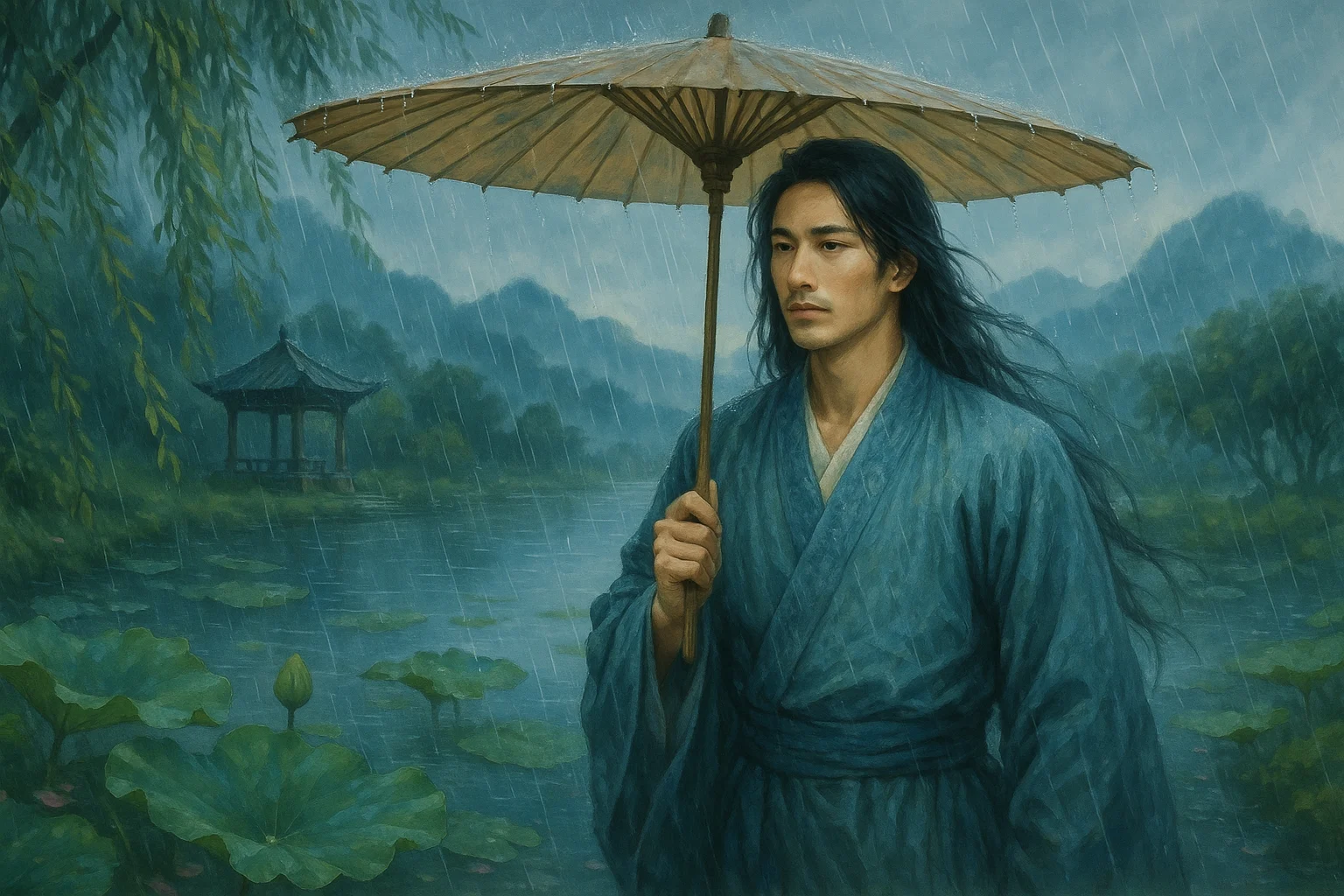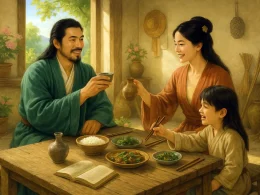Through reeds and streams, the lake wind sweeps so strong,
It shatters frozen waves, swift and sharp as song.
One slanting branch reflects the deep gate’s hue,
Cold, silent, bathed in moonlight’s fragrant dew.
Already thin and frail, who shares my view?
My soul lingers where Xu Xi’s bamboos grew.
I scorn to vie with blooms in spring’s vain show,
Yet let my brush in rain and mist bestow.
Original Poem
「宣州竹 · 小溪蓬底湖风重」
小溪蓬底湖风重。吹破凝酥动。
一枝斜映庾门深。
冷淡无言香泛、月华清。已经轻瘦谁为共。魂绕徐熙□。
吕本中
耻同桃李困春容。肯向毫端开发、雨云中。
Interpretation
This lyric by Lü Benzhong, a Southern Song poet shaped by war and exile, elevates the bamboo of Xuanzhou into a transcendent emblem of resilience. Composed during an era of fractured sovereignty, the poem channels the Confucian ideal of the "noble man" through bamboo’s unyielding posture—its hollow stems embodying humility, its evergreen leaves defying seasonal decay. By interweaving natural observation with allusions to Xu Xi’s paintings, Lü crafts a manifesto of artistic and moral integrity, rejecting the gaudy ephemerality of worldly success.
Upper Stanza: "小溪蓬底湖风重。吹破凝酥动。一枝斜映庾门深。"
Xiǎo xī péng dǐ hú fēng zhòng. Chuī pò níng sū dòng. Yī zhī xié yìng Yǔ mén shēn.
By the stream, beneath duckweed mats, lake winds press low—
rippling the curdled-milk surface till it splits.
A single stalk slants into Yu Gate’s depths.
The bamboo’s introduction is shrouded in elemental tension. "Lake winds press low" (湖风重) suggests both meteorological and political weight, while "curdled-milk surface" (凝酥) paints the water as something fragile yet nourishing—now "split" by forces beyond control. The "single stalk" (一枝) emerges obliquely, its diagonal shadow piercing Yu Gate (庾门), a likely reference to the secluded retreat of Yu Xin, a Liang dynasty poet-official who wrote nostalgically of lost homelands—a subtle nod to Lü’s own exile.
"冷淡无言香泛、月华清。"
Lěngdàn wú yán xiāng fàn, yuèhuá qīng.
Aloof, wordless, its scent drifts—
moonbeams crystallize its clarity.
Here, bamboo becomes a stoic sage. "Aloof, wordless" (冷淡无言) mirrors the Confucian ideal of understated virtue, while "scent drifts" (香泛) implies influence without proclamation. The "crystallized" moonlight (月华清) baptizes the bamboo in unearthly purity, elevating it beyond the mundane.
Lower Stanza: "已经轻瘦谁为共。魂绕徐熙□。"
Yǐjīng qīng shòu shuí wèi gòng. Hún rào Xú Xī __.
Already slender, who keeps it company?
My soul clings to Xu Xi’s [lost] brushwork.
The bamboo’s isolation ("who keeps it company?") mirrors Lü’s own spiritual solitude. Xu Xi (徐熙), the tenth-century painter renowned for his "boneless" ink-bamboo technique, represents an artistic ideal where form transcends physicality. The missing character (□) might hint at a fragmentary legacy—like the Southern Song’s fractured territory—or the ineffability of true art.
"耻同桃李困春容。肯向毫端开发、雨云中。"
Chǐ tóng táo lǐ kùn chūn róng. Kěn xiàng háo duān kāifā, yǔyún zhōng.
It scorns peach and plum, trapped in spring’s gaudy display,
choosing instead to unfurl from the brush-tip
amidst storm clouds.
The finale delivers a moral crescendo. Peach and plum (桃李), symbols of fleeting beauty and worldly favor, are "trapped" (困) by seasonal cycles, while bamboo—through Xu Xi’s brush (毫端)—"unfurls" (开发) in adversity ("storm clouds" 雨云中). The painter’s bamboo becomes a metaphor for art born of struggle, its strokes weathering tempests that would break lesser plants.
Holistic Appreciation
This ci centers on the bamboo of Xuānzhōu, weaving together physical scenery, painted imagery, and personified character. The first stanza depicts the bamboo’s environment and external grace—wind, lake, moonlight, and fragrance create an atmosphere of crystalline serenity. The second stanza shifts to its spiritual essence: "slender grace" and "never mingling with peach and plum" convey its solitary nobility and fortitude. Elevated through artistic motifs, the bamboo transcends nature to become a symbol of character. Blending scene and sentiment, the poem crafts an ethereal yet potent realm, reflecting Lü Benzhong’s late-life meditation on integrity and spirit.
Artistic Features
- Symbolism of Character
Bamboo serves as both natural object and spiritual mirror—embodying purity, independence, and resistance to conformity. - Exquisite Scenic Detail
Phrases like "wind shatters the frost’s hold" and "moonlight’s pure clarity" offer sensory richness, merging visual beauty with tactile and olfactory impressions. - Fusion of Painting and Poetry
Allusions to "Xú Xī’s brush" integrate artistic aesthetics, bridging literary and visual artistry. - Contrastive Emphasis
Juxtaposing bamboo with peach and plum highlights its evergreen resilience and reinforces thematic depth.
Insights
Through bamboo’s image, this ci imparts a philosophy of existence: resist conformity, refuse dependence on circumstance, and remain unmoved by fleeting glamour. Instead, maintain independence and nobility amid life’s storms. For modern readers, bamboo’s spirit urges us to anchor our core amid chaos, pursuing enduring inner strength and unblemished character.
The work also reveals that beauty dwells not only in vibrancy and flamboyance but also in cool serenity—like bamboo, growing quietly yet commanding a realm of its own.
About the Poet

Lü Benzhong (吕本中 1084 - 1145), a native of Shouxian in Anhui, was a renowned poet and Neo-Confucian scholar of the Southern Song Dynasty. As a key theorist of the Jiangxi Poetry School, he proposed the concept of "living method" (huofa), advocating for natural variation within established poetic rules. With over 1,270 surviving poems, his Genealogy of the Jiangxi Poetry School (Jiangxi Shishe Zongpai Tu) established Huang Tingjian as the school's patriarch, profoundly influencing Song poetic theory and serving as a bridge between the Jiangxi School and the Four Masters of the Mid-Song Revival.












